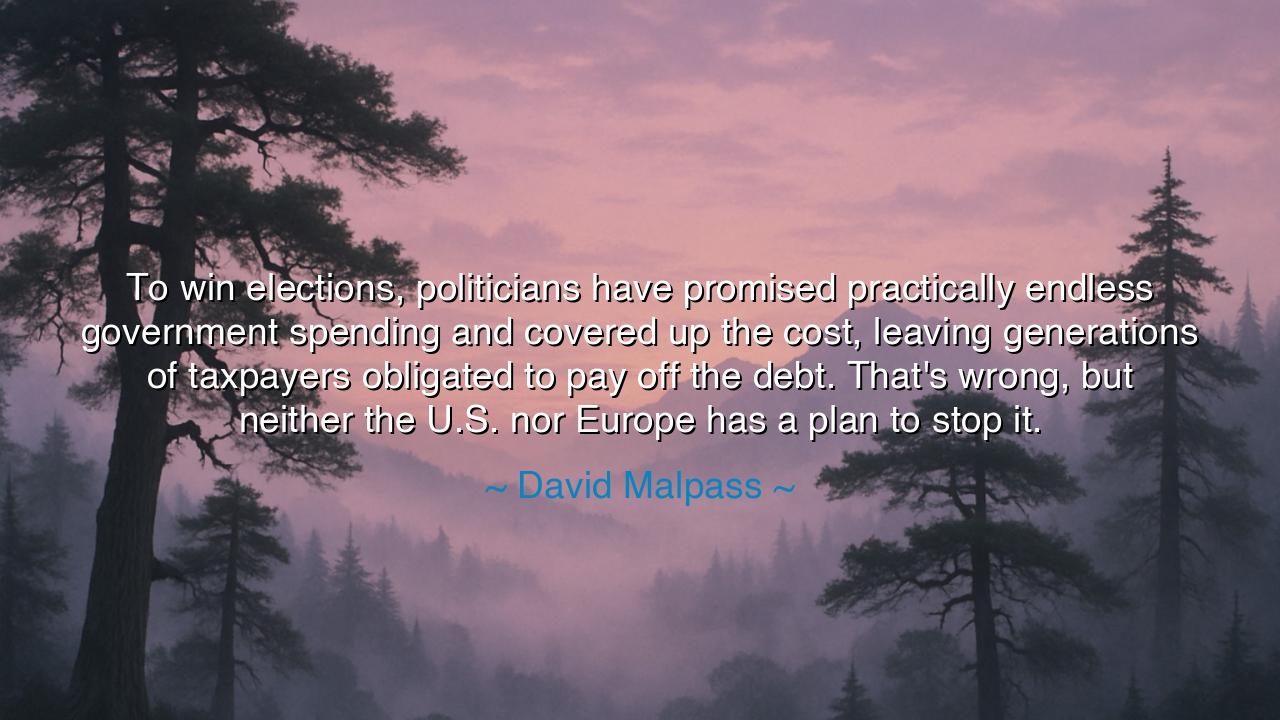
To win elections, politicians have promised practically endless
To win elections, politicians have promised practically endless government spending and covered up the cost, leaving generations of taxpayers obligated to pay off the debt. That's wrong, but neither the U.S. nor Europe has a plan to stop it.






The economist and statesman David Malpass once spoke words that pierce through the glittering veil of modern politics: “To win elections, politicians have promised practically endless government spending and covered up the cost, leaving generations of taxpayers obligated to pay off the debt. That's wrong, but neither the U.S. nor Europe has a plan to stop it.” This declaration, heavy with truth, is both lament and warning. It speaks to the ancient moral failing of mankind — the desire to enjoy today what tomorrow must repay. In his observation, Malpass exposes the cycle of deceit and debt that has bound free nations to invisible chains, a cycle sustained by greed, ambition, and the hunger for power dressed as generosity.
To understand the meaning of this quote, one must see it not merely as an economic criticism, but as a moral parable. Malpass is not condemning the act of governance, but the corruption of purpose within it — the transformation of leadership from stewardship to seduction. Politicians, he says, have learned to win hearts not by honesty, but by promising comfort without consequence, spending vast sums of public money to satisfy immediate desires while burying the cost beneath layers of debt. In this way, they buy the present with the future. It is a betrayal both of truth and of generations unborn — a theft from those who cannot yet speak, but who will one day bear the weight of the decisions made in their name.
The origin of this wisdom lies in the long history of nations that have forgotten restraint. From the decline of the Roman Empire to the crises of modern democracies, the same story repeats: rulers purchase popularity through excess, and empires crumble under the burden of their own promises. Rome, in her glory, fed her people with free bread and grand spectacles, thinking abundance would secure loyalty. But behind the marble facades, the treasury bled dry, and moral discipline vanished. When the gold was gone, and the legions unpaid, the empire collapsed — not from invasion alone, but from fiscal decay and moral exhaustion. So too does Malpass warn that modern nations, in their pride, repeat this folly — exchanging prudence for pleasure, principle for applause.
Consider the modern age, where governments borrow trillions, not to build, but to pacify; not to secure the future, but to preserve the illusion of prosperity. In times of crisis, spending may be necessary — but when spending becomes endless, when debt becomes habit, freedom itself is mortgaged. Every dollar borrowed is a silent contract signed by those not yet born. Malpass sees clearly what many ignore: that debt is not only an economic problem but a moral one. It weakens nations from within, for it replaces the virtue of hard work and sacrifice with the intoxication of ease and indulgence. And when the bill finally comes due, the people are left disillusioned, wondering how a system built on promise could end in ruin.
There is also a profound psychological truth in his words. When citizens grow accustomed to government largesse, they lose the very independence that sustains liberty. Dependency breeds apathy; apathy breeds control. Thus, reckless spending not only impoverishes economies — it erodes the spirit of democracy itself. When people demand without contributing, and leaders give without truth, both are complicit in the slow death of freedom. Malpass, like a prophet in a marketplace of noise, reminds us that no civilization can stand upon the shifting sands of unearned abundance. True prosperity is born of discipline, honesty, and foresight — virtues increasingly rare in a world dazzled by promises.
The lesson of this quote, therefore, is one of responsibility and courage. To restore balance, nations must rediscover the moral law that governs all wealth: that what is spent must be earned, and what is borrowed must be repaid. Citizens must demand not gifts, but truth — not endless benefits, but enduring justice. Leaders must remember that their duty is not to win elections, but to safeguard the future. And above all, the people must learn again the virtue of delayed gratification — the wisdom to endure today’s discipline for tomorrow’s security. Without such renewal, no economy, however mighty, can withstand the weight of its own deceit.
And so, my child, take these words as a timeless warning. Do not be seduced by promises that cost nothing; nothing worth keeping is ever free. Look to the leaders who speak not of what they will give, but of what they will build. Live with honesty, work with moderation, and remember that freedom demands restraint. For when a nation spends its way into comfort, it dreams itself into slavery. But when it honors thrift, integrity, and truth, it builds an inheritance not of debt, but of dignity — a legacy that no storm can destroy, and no generation need repay.






AAdministratorAdministrator
Welcome, honored guests. Please leave a comment, we will respond soon